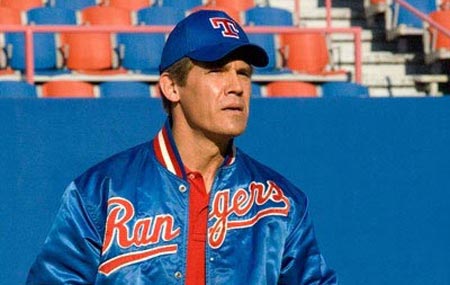3.5 stars (out of 5)
By R. Kurt Osenlund
The best thing to be said about the Bush biopic, “W.,” is that it's a sign of a return to form for director Oliver Stone. One of the real original mavericks, Stone was crafting smart, hot-button political dramas (“Born on the Fourth of July,” “JFK,” “Nixon”) long before he was applying cheesy Hollywood conventions to historic tragedies (“World Trade Center”) and everything but the kitchen sink to sagas about historic conquerors (“Alexander”). With its omnipresent bounciness and decidedly fair depiction(s), “W.” nibbles when it should bite, but its tremendous ability to both fascinate and entertain graciously suggests that, somewhere in there, Stone still has the chops and the nerve to make great movies.
“W.” is not a great movie but it comes pretty close. As absorbing as any political thriller, there's hardly a single dull moment in its 131 minute span. The script (by Stone's “Wall Street” scribe Stanley Weiser) uses criss-crossing chronology to illustrate Bush's rise to power. Jumping back and forth from the uncertain time between 9/11 and the Iraq War to the booze-soaked formative years in Texas, it offers executive decisions alongside frat boy pranks. Along the way, we also take in backyard barbecues, odd jobs, domestic disputes, car accidents, father-son fights, AA meetings, campaigns, debates, speeches, and prayers, all leading up to our president's eventual fall from grace. The film reads like a rock star's legacy played out on Capitol Hill and it's Stone's best work in years. What's surprising – and a bit disappointing – about the director's approach is how much he's chosen to file down his teeth. While far from being bi-partisan, “W.” isn't nearly as left-leaning or jabbing as one would expect, especially from someone as famously controversial as Stone. Instead, it paints Bush as a rather tragic sad clown, full of frailty and daddy issues. The aw-shucks courtesy of such a sympathetic take is dignified but it clashes with the movie's intrigue.

From a technical standpoint, Stone deserves nothing less than applause. Title notwithstanding, the director sees to it that we remember precisely who this film is about at all times. Often in close-up or extreme close-up, he keeps his camera fixed on Bush, regardless if he's running his 3-mile morning jog or running for Congress. Sometimes from low, imperial angles, we see this troubled man of power succeed, suffer, and sweat. Never one to skimp on aesthetics, Stone knows the weight of his material and finds a look to match it.
As the big man himself, Josh Brolin touches brilliance. He's on dangerous ground, playing someone who's been parodied to death, but he thankfully sidesteps “Saturday Night Live”-style sketch comedy by finding the perfect balance of caricature and honest portrayal. The magnetism of the subject matter lends a mighty hand, but Brolin deserves much of the credit for convincing us that what we're watching is more than just a movie. His performance is brave, immersive, and well-rounded and it's one of the best of the year. Fittingly, Brolin has a massive amount of support, chiefly from Elizabeth Banks, who glows in her biggest role yet as Laura Bush. Not far behind are Toby Jones as Karl Rove, Richard Dreyfuss as Dick Cheney, Jeffrey Wright as Colin Powell, and James Cromwell as Bush Sr., all of whom dig deep into their real-life counterparts in equally human and humorous ways. The sole cartoonish player in this game is Thandie Newton as Condoleeza Rice. Exaggerating the Secretary of State's twitches and grimaces to the umteenth degree, Newton's amateurish imitation is “W.”'s only forced joke.

The rest of the film's comedy (and horror) seems to manifest simply from our acute awareness of its source. Nothing that's “revealed” to us about Dubya's private life holds a candle to what he's done publicly, which Stone recreates in seamless 35 mm and mock archival footage. In an all-too-memorable press conference, when Bush is asked by a reporter to reveal his biggest presidential regret, his stuttering admittance to having “confidently made mistakes” is as painfully funny as ever. During speeches, the oblivious use of words like “nucular” has a priceless ring that no screenplay could top. In other words, you just can't write this stuff. Like Michael Moore's “Fahrenheit 9/11,” Stone's film proves once and for all that, no matter what directorial stance is taken or what editorial techniques are employed, a character as naturally buffoonish as Bush can do bad all by himself.
The worst thing to be said here is that “W.” could be terribly ill-timed. Amidst this crazy election, which is arguably just as entertaining, is anyone even thinking about Bush? Does anyone even care? As unprecedented as Stone's push for a 2008 release may be (find me another film that's directly devoted to skewering a sitting president), the director faces a very real danger of the public's fatigue of the current Commander in Chief winning out over its curiosity. Undeniably important in spite of it weaknesses, “W.” seems primed to have the lasting power of Stone's better projects. More immediate success will be determined by whether or not today's moviegoers have any interest at all in approving this message.


No comments:
Post a Comment